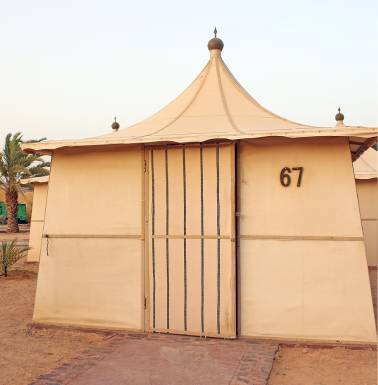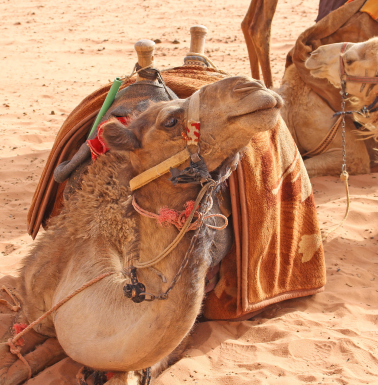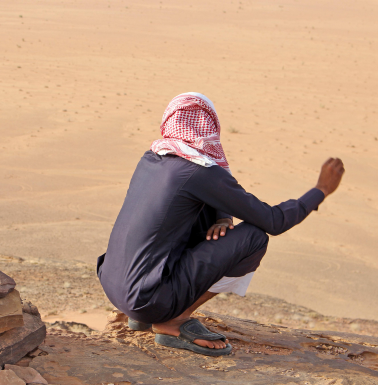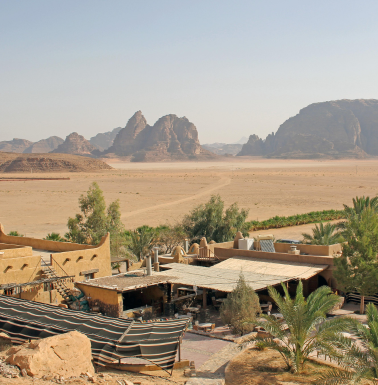Petra to Wadi Rum and Bait Ali camp
Leaving Petra, knowing I might not be back, was a life moment. (See my Petra post here.) Ahmad and I headed off on the Kings Highway, winding around hillsides to our first rest stop, a souvenir shop with no tourists, where Ahmad got a coffee and had a couple of smokes, and I used the bathroom. The three-story shop was high on an escarpment. The view from the wall of windows in the women’s bathroom was spectacular. I hope the men had a good view, too. In the small dusty garden, there was a Blessed Mother and Christ Child statue, painted eyes, red lips, and gold trim on their garments. The only other people I saw there were the woman who made coffee and two men upstairs, talking and pacing when we came and lounging on pallets when we left. Before we took the turn-off to Wadi Rum, we stopped again. Ahmad wanted cigarettes but didn’t want that to be the only thing he bought, so he came back with a pack of cookies, too. I ate only one.
Jordan has few natural resources. No oil, no minerals to speak of. But phosphates – that is one resource they do have. We crossed the phosphate train tracks to get to Bait Ali camp. An undated online slide deck says that the Aqaba Railway Corporation transports phosphates from the mines to the port. We stopped on the tracks and Ahmad took a photo in the direction of Aqaba. Before sunrise the next day, I heard a train.
I do all the tourist things and am proud of it
I’ve read reviews of Bait Ali camp and a just few are a little sniffy because it’s not really a Bedouin camp, and you’re not really sleeping in the desert. And the camel rides are short. I can understand if people want to sleep in the desert with Bedouin hosts, but the camp suited me well. My halfway house to the real thing, maybe. I had a tent with an electric light bulb but no water, and just a little latch on the door. Tent # 67 was my first tent since Girl Scouts. When Ahmad and I arrived the camp seemed empty except for Youssef in the unlit reception. He was behind his desk, cooled by an electric fan, working at the camp’s only computer. I asked rhetorically whether I was the only person here. Ahmad took that to heart and said if I were uncomfortable staying here he could take me to another place, which at that point, would have to be Aqaba. But I wasn’t planning to leave. I handed over most of my cash, part to Youssef, because the camp is cash only, and the rest to Ahmad, who left to arrange for my Jeep tour of Wadi Rum and a camel ride. Ahmad returned with the details and added that the Jeep driver was a nice young man. Then he left for Aqaba, telling me to email him when I got back to camp from riding the Jeep and camel.

Home at Bait Ali
A tourist in the desert
Jeep tours and camel rides are desert staples. I’ve seen the pictures of Jeeps flying over dunes. And a Jeep tour meant a Jeep to me. I drive a Jeep and walked out of the camp gate looking for one. But I found out that a “jeep” is anything that runs, and it can be an old stick-shift Toyota pick-up like my guide drove. The truck did the job. Parts of the interior were decorated with a shaggy lilac fabric that also wrapped the gear shift. The center console had lost its top, and a carefully sized and sanded plywood top had been put in its place. My guide wore a dark dishdasha and red and white kaffiyeh. A well-used Koran with gold script on the spine lay on the dash. He was a Bedouin, one of the indigenous people of the desert. He spoke pretty good English, and he told me his father also spoke English.
On our way to the desert, we drove in the sand alongside a paved road. “What kind of bones are they?” I asked when I saw a scattering. “Camel bones,” he said. This was the moment when I felt weird. It was so unfamiliar. There were dried bones lying around. I didn’t know where I was going. Ahmad was gone. When would he start to worry if I didn’t email? But we will see where this goes, how it turns out. It’s why I’m here, and this young man – whose name I never learned – earns a living taking tourists to the desert. Later he told me that his older brother does the same thing. (I read that most people in the wadi now make their living from tourism.) He told me he played oud (a stringed instrument) and his father plays rababa (mentioned in my Petra by Night post). Later I drank tea with him and his father, on mats under their olive trees, while the family’s camel grazed alongside. His father was a slender handsome man with good English. I also met a younger brother, but not his mother.
We drove to the tourist places in the desert, saw where T.E. Lawrence had hidden out. We went up and over the edges of precipitous dunes for an exhilarating ride down, just like the pictures. We stopped at a Bedouin tent opposite a butte with a slide of sand, a sort of sand avalanche, at its base. My guide invited me in to drink tea with him and the young man in the tent. There were some souvenirs on tables but no one tried to sell me anything. My guide and host sat on facing benches talking and studying their cell phones. Video? Sports? Who knows. My seat was about 15 feet away. Another truck pulled up and the driver unleashed a white couple to climb the sand avalanche while he came inside. My host asked if I wanted more tea, and because I didn’t, we went on to the camels.
Baba the camel
The camels were waiting just where camel pictograms and other more inscrutable symbols are carved on the rocks. My guide said they were 2,000 years old; evidently, I read later, they are some of the Nabatean carvings in the wadi. Lots of tourists ride camels. I missed the chance to ride the camel at a Renaissance fair one time, so here I met my first camel close-up. Camels might be bad-tempered, but as a friend said, they always look like they’re smiling. Now, if what you want to do is ride a camel across the desert, one hour in the camel saddle won’t satisfy. But as with the camp, this was perfect for me, though I could have ridden longer. I didn’t have any trouble getting on the saddle although it was a little high – a crouching camel is still pretty high up. And I got some sounds of approval from my camel guide when I mounted. And the best bit was that I was alone with the guide, not one of a straggly line of tourists.
My camel guide spoke some English. He only needed a few words – he looked back now and then, smiled and asked, “OK?” Once he sang a Bedouin song, and I clapped along with him. Our sounds echoed from the buttes and hills that rise abruptly from the sand. With their vertical surfaces scarred and weathered, they looked Biblical – “the mountains melt like wax.” Sometimes, when we were on a path between buttes, the echo of singing made it sound like we were in an enormous room. Often the camels would drag us to a scrubby bush and break off a mouthful, but my guide would get them back on course except once, when the camels actually ran to an unusually succulent-looking bush. We let them eat for a while – the snap and rip of twigs, then the resonant chewing, loud even over the sound of my windblown, tied-down hat rubbing against my ears.
I got used to the undulations of the ride quickly – you have to let your back stay flexible. I was feeling good, just me, the guide, the shadows and the late-day sun, camels eating their scrub brush, now moving along with the camel’s rhythm, the blowing sand and strong wind – and then we came to the end.

My ride in Wadi Rum

My Wadi Rum guide tossing pebbles
My guide turned to me and demonstrated a hold on the rear ghozel before he had the camel crouch. Well, that was good, because I’d have been head first over the camel if I hadn’t kept a tight grip. My waiting jeep guide took my picture with an effigy of Lawrence, and we were off in the “jeep.”
We stopped for a while and walked in the desert. We climbed a hill, and my guide showed me how to write my name in Arabic in the sand. From the height, we saw three or four pick-ups with tourists lined up on benches in the truckbeds. “They’re going out to see the sunset,” my guide said. They waved at us up on the hill. And at that moment, I was pleased, almost proud, that the two of us were watching the sunset up there alone.
Back at Bait Ali
Back at the camp from the jeep tour I wandered around for a while, waiting for dinner, poking around everywhere except up the high ridge beyond the dining and pool areas. A man in slacks and a plaid shirt approached me and asked where I was from. He seemed friendly – from the U.S., I told him. Then he called out to some friends who came over. They pulled out phones and asked for group pictures with the American. So I stood arm in arm with men and women I’d never met, all of us smiling, some speaking English and others not. I left the camp that night on many cell phones.
Several men served us dinner cafeteria style without cracking a smile. The food was good but I was hungry and there were no seconds. I wanted to ask, “More please,” like Oliver. I also had to buy extra water – “big water” on my bill. I had run out at last. Other camp guests had materialized and were spread around the open dining area. A film crew from England was back after a day shooting an adventure series in the desert. I ate alone not far from the film crew, overhearing about their day. (At breakfast in the morning I talked to one of the crew – I didn’t recognize the series name, and he wasn’t surprised.)

Bait Ali camp
My “group photo” friends were local people who had gathered at Bait Ali for a party. After dinner the party got going with loud talking, clapping, singing and recorded music, but at 9:18 PM sharp, the music stopped abruptly. No winding down, no transition to mood-changing quiet songs – one moment loud, then silence. They slowly loaded up on buses and by 10 PM, the camp was quiet. On this day, I had spent hours in heat and dust in Petra and had come right to the desert in Wadi Rum. I was really dirty but the showers and toilets were across the compound. I didn’t want to bathe. It was late. The shower room was dark. I hadn’t packed a robe or towel. I washed my face with sensitive, unscented Pampers wipes (I can take a whole bath with these) and stepped outside my tent to brush my teeth with my “big water.” Bathe in the morning. Figure out what to dry myself with.
I opened my window flap and lay down in my very tired clothes. As I settled on the cot, I heard crickets and an odd bird-like trill. Then I heard a laughing woman say in English, “oh – I’m a virgin!” I slept brilliantly and in the freezing early morning, wrapped myself in the blanket that was folded neatly at the foot of the cot, waiting for me to grab it.
Camp hints. For tent dwellers, you will need a towel, wash cloth and soap. I didn’t even think about that, and had to dry with the flannel cover I use for my airplane pillow. Ahmad suggested later that I could have used the sheet from the extra cot in my tent. Luckily I’d taken the leftover soap from my hotel in Wadi Musa.
For this trip I carried a pack of sensitive, unscented Pampers wipes for emergency washing up. Even without soap and water I can get clean enough to keep me going a day until a bath. I washed my face with Pampers wipes the night I slept in my clothes. I buy these in the travel and trial size section at my local Target.
Bait Ali’s stucco cabins might be en suite. Check into that if it’s important to you.
Wifi. Wifi was limited and accessible only from the camp office. Moreover, the wifi connection required an access code, so every time I got out of range, I needed a new code to reconnect. Youssef must have gotten tired of me. But the only time I really needed wifi was to email Ahmad that I was back from the desert. Not having wifi left me listening in on other people’s conversations at dinner instead of checking email. Some were more interesting than my emails. I guess it’s not such a bad thing to eavesdrop.
